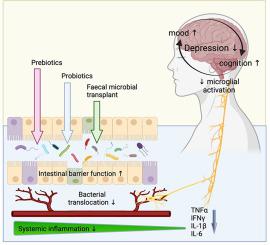Journal of Hepatology ( IF 26.8 ) Pub Date : 2021-11-17 , DOI: 10.1016/j.jhep.2021.11.008 Victoria T Kronsten 1 , Thomas H Tranah 1 , Carmine Pariante 2 , Debbie L Shawcross 1

|
Depression and chronic liver disease (CLD) are important causes of disability, morbidity and mortality worldwide and their prevalence continues to rise. The rate of depression in CLD is high compared to that of the general population and is comparable to the increased rates observed in other medical comorbidities and chronic inflammatory conditions. Notably, a comorbid diagnosis of depression has a detrimental effect on outcomes in cirrhosis. Systemic inflammation is pivotal in cirrhosis-associated immune dysfunction – a phenomenon present in advanced CLD (cirrhosis) and implicated in the development of complications, organ failure, disease progression, increased infection rates and poor outcome. The presence of systemic inflammation is also well-documented in a cohort of patients with depression; peripheral cytokine signals can result in neuroinflammation, behavioural change and depressive symptoms via neural mechanisms, cerebral endothelial cell and circumventricular organ signalling, and peripheral immune cell-to-brain signalling. Gut dysbiosis has been observed in both patients with cirrhosis and depression. It leads to intestinal barrier dysfunction resulting in increased bacterial translocation, in turn activating circulating immune cells, leading to cytokine production and systemic inflammation. A perturbed gut-liver-brain axis may therefore explain the high rates of depression in patients with cirrhosis. The underlying mechanisms explaining the critical relationship between depression and cirrhosis remain to be fully elucidated. Several other psychosocial and biological factors are likely to be involved, and therefore the cause is probably multifactorial. However, the role of the dysfunctional gut-liver-brain axis as a driver of gut-derived systemic inflammation requires further exploration and consideration as a target for the treatment of depression in patients with cirrhosis.
中文翻译:

肠道源性全身炎症是慢性肝病抑郁症的驱动因素
抑郁症和慢性肝病 (CLD) 是全球残疾、发病率和死亡率的重要原因,并且它们的患病率持续上升。与一般人群相比,CLD 患者的抑郁症发病率较高,并且与在其他医学合并症和慢性炎症性疾病中观察到的发病率增加相当。值得注意的是,抑郁症的共病诊断对肝硬化的预后有不利影响。全身性炎症是肝硬化相关免疫功能障碍的关键——这种现象存在于晚期 CLD(肝硬化)中,并与并发症、器官衰竭、疾病进展、感染率增加和预后不良有关。全身性炎症的存在在一组抑郁症患者中也有详细记录;外周细胞因子信号可通过神经机制、脑内皮细胞和心室周围器官信号传导以及外周免疫细胞-脑信号传导导致神经炎症、行为改变和抑郁症状。在肝硬化和抑郁症患者中都观察到了肠道菌群失调。它导致肠屏障功能障碍,导致细菌易位增加,进而激活循环免疫细胞,导致细胞因子产生和全身炎症。因此,肠-肝-脑轴的紊乱可能解释了肝硬化患者抑郁症的高发病率。解释抑郁症和肝硬化之间关键关系的潜在机制仍有待完全阐明。可能涉及其他几个心理社会和生物学因素,因此,原因可能是多方面的。然而,功能失调的肠-肝-脑轴作为肠源性全身炎症的驱动因素的作用需要进一步探索和考虑作为治疗肝硬化患者抑郁症的目标。











































 京公网安备 11010802027423号
京公网安备 11010802027423号